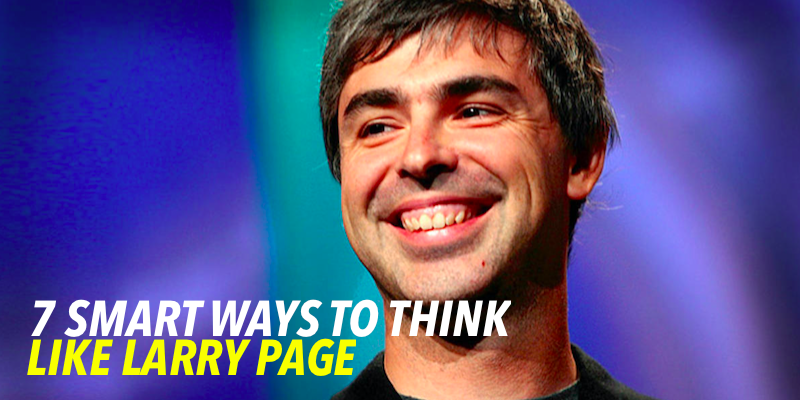Page’s leadership style is distinct — and shaped by both his background as an engineer and his upbringing as the son of two computer science professors in Michigan, where he likely learned lessons from General Motors.
With his supreme power to initiate the foundations of the most widely used internet search engines in the world, Larry Page is a man of substance is and has been a great source of inspiration for his excellent business tactics. Spending $1 billion on patents offers an important clue to what matters most to Page: innovation.

Here are the 7 Smart ways to think and act like Larry Page – “The Google Guy”,
1. Continually make small improvements
At first this one seems to run counter to the previous, but in reality they are complementary. Yes, you want to have a huge focus on ginormous disruptive innovation in terms of developing new products or services.
However, once that new product or service has been successfully launched, Page is all about making sure people keep tinkering with it to add new features and make small improvements that enhance usability.
That happens to be a great way to keep customers engaged and loving your company.
2. Be quick. Be concise
Page in the past had worked towards cultivating a faster, more nimble management approach at Google. He had asked staff to give him 60-word updates or pitches on their current projects. That comes out to about two compressed paragraphs to impress and compel. Page encourages faster decisions and openness.
3. Hire great people and minimize bureaucracy
Page is not fond of traditional management. He’s more interested in hiring fantastic people who just naturally do the right thing for the company. For a long time Page insisted on being involved in nearly every hiring decision.
Obviously that was only feasible for some amount of time in the early years (the company now has upwards of 50,000 employees). As Page himself puts it, “We don’t have as many managers as we should, but we would rather have too few than too many.”
Does it pay off? According to a 2011 article on Fortune.com soon after Page became CEO, three of the six people recently promoted to lead Google’s major product divisions are among the first 10 or so employees the company hired, dating back to 1998.
4. Balancing technology and business strategy
Google has come up with amazing, disruptive technologies that are in and of themselves game-changers. By themselves, these technological innovations would have had a huge impact on the global Internet space.
But it is in combining solid business acumen with disruptive technological innovation that Google has become the corporate powerhouse that it is today.
5. Pay attention to your crazy ideas and cultivate the best of them
Page urges his teams to believe in audacious ideas. By tackling big ideas “that could really change the world,” you attract incredibly smart people and achieve something worthwhile, even if it’s not your original goal. The idea for Google’s search engine came to Page in a dream about downloading the entire web and keeping the links, he told Michigan graduates.
6. Be persistent
Page had the initial idea for Google’s book digitization back in the mid 1990s. It took him six years after co-founding Google before the first book was scanned as part of the project in 2004. The same thing applies to the idea of “street view” on Google Maps.
This is a theme you’ll find running through the lives of nearly every highly successful entrepreneur – so much so that to put it in every article would become overly repetitive for readers. But it’s worth expanding on it here and now.
7. Focus on big, disruptive innovations
Page thinks incremental change is for the birds. He wants to go for the totally audacious ideas that would really turn things upside down for the better if they panned out.
Sometimes they do and sometimes they don’t. Sometimes an idea that doesn’t pan out morphs into something else that becomes incredibly successful.
Take, for instance, the Google group that was working on artificial intelligence. That didn’t pan out, but they did come up with an ad targeting system that ended up accounting for half the company’s revenues. Not bad for what was essentially a misfire, right?

